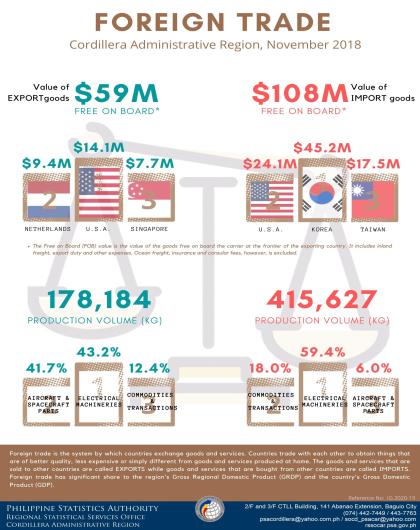Foreign trade is the system by which countries exchange goods and services. Countries trade with each other to obtain things that are better quality, less expensive or simply different from goods and services produced at home. The goods and services that are sold to other countries are called exports.
The Cordillera Administrative Region (CAR) produced 28,196,387 kilograms (kgs.) exports volume for February 2016, exceeding the volume produced from January 2016 which is 1,583,794 kgs.
The region’s free on board (FOB) value of export goods for February 2016 amounted to $118,285,337. The FOB value in the region for February 2016 decreased by 12.0% from the amount of $131,943,635 last January 2016.
Exports By Commodity
- Among the commodities, machinery and mechanical appliances, electrical equipment, parts thereof, sound recorders and reproducers, and parts and accessories of such articles ranked first on export sales with a share of 85.9% in January 2016 and until February 2016 at 78.6% with export receipts totaling to $113,295,971 and $93,021,323, respectively. Vehicles, aircrafts, vessels and associated transport equipment come next at $17,360,190 and $24,821,275 FOB value accounting to 13.2% of share in January 2016 and 21.0% in February 2016.
- The miscellaneous manufactured articles ranked the least in exports share accounting only $1,202 in January 2016, and $0 FOB value in February 2016.
Country of Destination
- As of February 2016, CAR largely exported to 3 countries, namely Singapore, The Netherlands, and the United States of America (USA). Singapore had the biggest share of the region’s exports at 36.6% with total value of $43,272,699, followed by the Netherlands with 24.6% amounting to $29,157,363 of exports value, and the United States of America (USA) at 12.7% or $15,028,942 in total value.
- The region also exported goods to countries such as Malaysia, Mexico, Canada, Republic of Korea, Israel, UAE, Switzerland, Thailand, India, Poland, Saudi Arabia, Qatar, Vietnam, Portugal, Ireland, Brazil, Italy and Austria. These countries had exports value registering in total payments of $1,855,596 or 1.6% of the total CAR Exports.
- The Asia-Pacific Economic Cooperation (APEC) member countries are the primary foreign trading partners of CAR. APEC is composed of 21 member countries, namely: Australia, Brunei Darussalam, Canada, Chile, People’s Republic of China, Hong Kong, Indonesia, Japan, Republic of Korea, Malaysia, Mexico, New Zealand, Papua New Guinea, Peru, Philippines, Russia, Singapore, Taiwan, Thailand, United States of America, and Vietnam.
- In February 2016, APEC countries had total exports receipts amounting to $79,396,072 representing 67% of the total exports in the region. Meanwhile, exports to non-APEC countries comprised 33% of the total goods and commodities exported valued at $38,889,265.
- Among the APEC member countries, Singapore topped the region’s foreign export sales receipts registering 54.5%, followed by the United State of America at 18.9%, Taiwan at 9.8%, People’s Republic of China at 6.9%, Japan at 4.7%, Hong Kong at 3.3%, and the rest of the APEC countries at 1.9%.
- Machineries and mechanical appliances were the leading export products of CAR to Singapore with total earnings of $41,823,093. These were followed by vehicles, aircrafts, and other export goods with total value of $1,387,738.
- The Netherlands is the region’s Non-APEC country primary buyer of machineries and mechanical appliances with export receipts equivalent to $29,155,180.
Technical Notes
Free on Board Value (FOB) - is the value of the goods free on board the carrier at the frontier of the exporting country. It includes inland freight, export duty and other expenses. In addition, the value of goods in the Philippine foreign trade statistics is FOB.
Country of Destination (Exports only) - it is the country where the goods are to be consumed, further processed, or manufactured.
Country of Origin (Imports only) - it is the country where the goods are mined, grown, or manufactured or where each foreign material used or incorporated in a good underwent a change in tariff classification indicating a substantial transformation under the applicable rule of origin for the good.
Exports - the goods and services that are sold to other countries.
Imports - the goods and services that a country buys from other countries.
PSCC (Philippine Standard Commodity Classification) - is used to classify the imported commodities at the most detailed level for statistical purposes.


